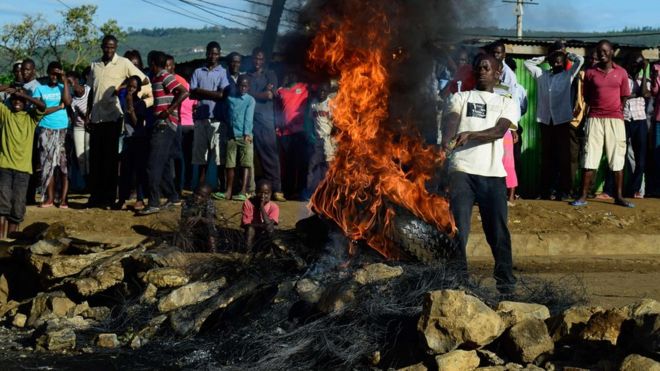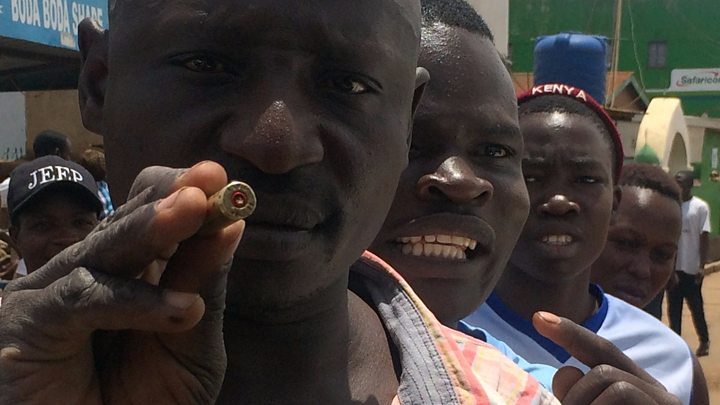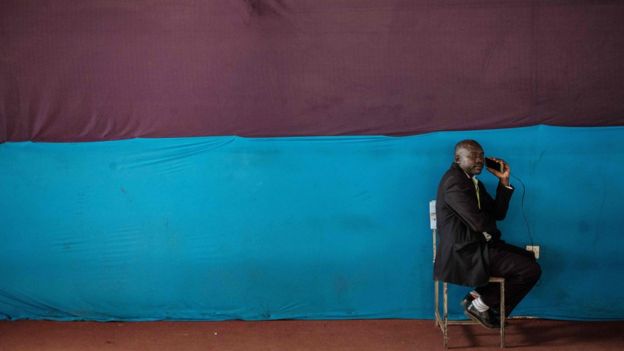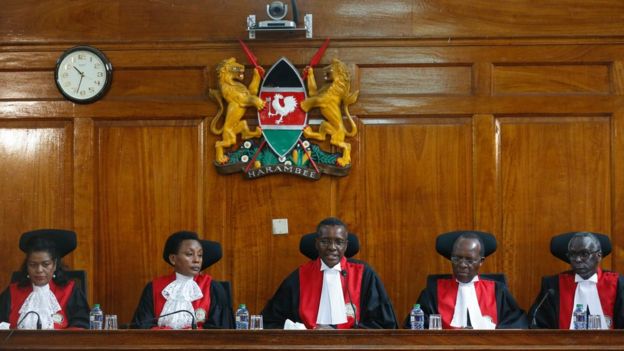Kenya election: No clear road ahead after run-off vote
 AFP
AFP
The re-run of Kenya's presidential election has taken place, but early signs are the overall turnout has been far lower than the first poll which was annulled by the Supreme Court.
The legitimacy of this election was being questioned even before the voting began, but if the 46% of the country who voted for the opposition last time have failed to turn up, the whole process will be further undermined.
Kisumu, like other parts of western Kenya, is an opposition stronghold and very few - if any - votes have been cast here.
The returning officer at Kisumu Central constituency tallying centre cut a lonely figure.
He and just two other Independent Electoral and Boundaries Commission (IEBC) officials turned up for work - out of the 400 who should have been running the poll here.
The ballot boxes hadn't arrived by 07:00, but were then dropped off by a Prisons Service coach.

Although the three IEBC staff went through the motions by placing the voting kits into each ballot box, there was nobody to take them to the polling stations or to oversee the election.
And even if there had been, they probably wouldn't have been allowed to enter the various buildings in town set aside for voting.
Intimidation was the cause.
Commercial truck drivers didn't want to risk carrying ballot boxes or voting slips, as gangs of youths were out, threatening anyone associated with trying to make the vote happen.
The main roads in Kisumu were blocked by lines of rocks and burning tyres every 150m (164yds), most of them manned by angry young men with sticks.
They shouted anti-Kenyatta slogans and complained at the way the police were firing live bullets and teargas to disperse the protests.
Throughout the day they played a cat-and-mouse game with the security forces: rocks and slingshots versus teargas and in some cases live ammunition - usually fired overhead.
But there were a handful of gunshot injuries and at least one person was killed.
George Odhiambo, 19, was brought into hospital with a serious bullet wound in his upper leg and died after losing too much blood.
 AFP
AFP
When Kenya's Supreme Court annulled the August presidential election, the decision was lauded as a triumph of judicial independence and African democracy in action.
Both were shattered in the lead-up to the vote.
Riddled with bullets
The courts were kept busy trying to cope with claims and counter-claims, but two key things will haunt this second ballot and provide ammunition for claims of illegitimacy.
The first was the hail of gunfire that seriously injured the deputy chief justice's bodyguard two nights before the ballot.
The second was that Supreme Court judges were simply unwilling to turn up to work.
It's perhaps not surprising Lady Justice Philomena Mwilu did not attend court the morning after her car was riddled with bullets.
Luckily she was not in the vehicle at the time.
It was clearly interpreted as a serious threat to her life - a grotesque and blatant attempt to intimidate the country's second most senior judge.
And it worked.
 EPA
EPA
The Chief Justice, David Maraga, apologised to all parties who had gathered for an urgent petition asking the court to stop the re-run of the presidential vote the day before the ballot.
They were unable to hear the case, he said, because they didn't have a quorum.
Five of the court's seven judges must be present for decisions to be valid, but only two made it into work that day.
Lady Justice Mwilu was not in a position to come to court "following the events of last night which are in the public domain," the chief justice said.
Justice Mohammed Ibrahim had been ill for some time and was out of the country.
Lady Justice Njoki Ndung'u was "unable to get a flight back to Nairobi in time" and Justices Ojwang and Wanjala "are not able to come to court," he said, without any further explanation.
'Difficult to guarantee'
The highest court in the land - with an opportunity to rule on the contradictions of electoral law, the constitution and its various interpretations - stepped back and allowed the election to go ahead without further discussion.
The case has been suspended - it will no doubt be revisited, but only after it's too late.
After faith in the IEBC was shattered by its failings on the first attempt, it seems unlikely a large percentage of the population will accept the re-run result.
Just last week the chairman of the IEBC, Wafula Chebukati said: "It is difficult to guarantee a free, fair and credible election."
But he nevertheless announced the ballot would go ahead, "based on the assurances given to the commission" on security and on the progress made in ensuring the vote was free and fair.
And in many parts of the country it did go ahead - ruling party strongholds no doubt recorded plenty of votes, but overall it appears the numbers are down.
The lower the turnout, the louder the voices of dissent will be.
And with opposition strongholds unwilling to vote and seemingly prepared to prevent others from doing so, Kenya faces continuing uncertainty.
Comments
Post a Comment
Please be brief